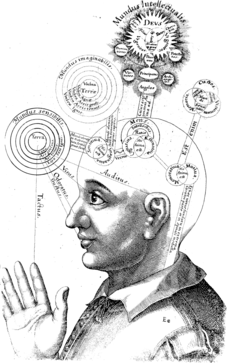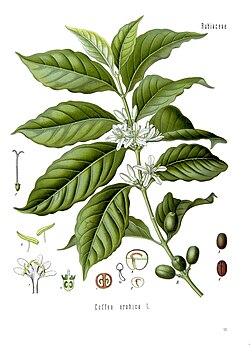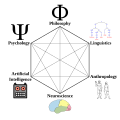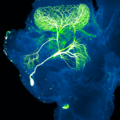Cognition is the "mental action or process of acquiring knowledge and understanding through thought, experience, and the senses". It encompasses all aspects...
51 KB (5,988 words) - 19:46, 17 May 2025
Embodied cognition represents a diverse group of theories which investigate how cognition is shaped by the bodily state and capacities of the organism...
178 KB (21,017 words) - 20:36, 10 May 2025
Animal cognition encompasses the mental capacities of non-human animals, including insect cognition. The study of animal conditioning and learning used...
122 KB (15,111 words) - 00:57, 18 April 2025
for all of cognition: a unified theory of cognition, or cognitive architecture. The research started by Newell on unified theories of cognition represents...
4 KB (527 words) - 01:33, 24 February 2025
Cognition AI, Inc. (also known as Cognition Labs), doing business as Cognition, is an artificial intelligence (AI) company headquartered in San Francisco...
7 KB (603 words) - 15:19, 17 May 2025
The need for cognition (NFC), in psychology, is a personality variable reflecting the extent to which individuals are inclined towards effortful cognitive...
27 KB (3,264 words) - 17:46, 30 September 2023
Nootropic (redirect from Cognition enhancer)
commonly advertised with unproven claims of effectiveness for improving cognition. The Federal Trade Commission and FDA have warned manufacturers and consumers...
33 KB (3,254 words) - 04:52, 11 May 2025
Social cognition is a topic within psychology that focuses on how people process, store, and apply information about other people and social situations...
44 KB (5,303 words) - 23:04, 1 May 2025
Enclothed cognition has been described as the overall influence that clothing has on the wearer's psychological processes. The term was coined by Hajo...
24 KB (2,981 words) - 23:52, 4 January 2025
Distributed cognition is an approach to cognitive science research that was developed by cognitive anthropologist Edwin Hutchins during the 1990s. From...
31 KB (3,719 words) - 19:31, 28 March 2025
Numerical cognition is a subdiscipline of cognitive science that studies the cognitive, developmental and neural bases of numbers and mathematics. As...
33 KB (4,235 words) - 15:46, 16 May 2025
its processes. It examines the nature, the tasks, and the functions of cognition (in a broad sense). Mental faculties of concern to cognitive scientists...
74 KB (8,629 words) - 20:55, 22 April 2025
emotional state. Put simply, hot cognition is cognition coloured by emotion. Hot cognition contrasts with cold cognition, which implies cognitive processing of...
18 KB (2,332 words) - 06:12, 19 March 2024
Elephant cognition is animal cognition as present in elephants. Most contemporary ethologists view the elephant as one of the world's most intelligent...
65 KB (7,425 words) - 01:24, 9 April 2025
Computational cognition (sometimes referred to as computational cognitive science or computational psychology or cognitive simulation) is the study of...
14 KB (1,570 words) - 12:12, 6 April 2024
Paranoia (redirect from Paranoid social cognition)
cause of paranoid cognitions is inside the head of the people (social perceiver), and dismisses the possibility that paranoid cognition may be related to...
38 KB (4,493 words) - 02:05, 8 March 2025
The evolution of cognition is the process by which life on Earth has gone from organisms with little to no cognitive function to a greatly varying display...
16 KB (2,064 words) - 04:42, 16 May 2025
Insect cognition describes the mental capacities and study of those capacities in insects. The field developed from comparative psychology where early...
24 KB (2,798 words) - 00:32, 18 April 2025
Quantum cognition uses the mathematical formalism of quantum probability theory to model psychology phenomena when classical probability theory fails...
30 KB (3,486 words) - 08:42, 11 January 2025
Perseverative cognition is a collective term in psychology for continuous thinking about negative events in the past or in the future (e.g. worry, rumination...
15 KB (1,612 words) - 05:48, 27 December 2023
embedded cognition (EEC) is a philosophical theoretical position in cognitive science, closely related to situated cognition, embodied cognition, embodied...
5 KB (644 words) - 15:11, 25 February 2025
Epistemic cognition, sometimes known as epistemological beliefs, or personal epistemology, is "cognition about knowledge and knowing", an area of research...
10 KB (970 words) - 22:15, 6 April 2024
Situated cognition is a theory that posits that knowing is inseparable from doing by arguing that all knowledge is situated in activity bound to social...
52 KB (6,730 words) - 13:15, 26 February 2025
Metacognition (redirect from Meta-cognition)
The term metacognition literally means 'above cognition', and is used to indicate cognition about cognition, or more informally, thinking about thinking...
79 KB (10,093 words) - 06:56, 27 April 2025
The cultural cognition of risk, sometimes called simply cultural cognition, is the hypothesized tendency to perceive risks and related facts in relation...
23 KB (2,677 words) - 02:06, 17 July 2024
The concept of motor cognition grasps the notion that cognition is embodied in action, and that the motor system participates in what is usually considered...
27 KB (3,155 words) - 03:18, 25 April 2025
Augmented cognition is an interdisciplinary area of psychology and engineering, attracting researchers from the more traditional fields of human-computer...
15 KB (1,758 words) - 14:17, 11 March 2025
Thinking, Fast and Slow (redirect from System 1 (cognition))
Thinking, Fast and Slow is a 2011 popular science book by psychologist Daniel Kahneman. The book's main thesis is a differentiation between two modes of...
35 KB (3,934 words) - 21:37, 7 May 2025
Implicit cognition refers to cognitive processes that occur outside conscious awareness or conscious control. This includes domains such as learning,...
34 KB (4,529 words) - 19:17, 3 September 2024
Comparative cognition is the comparative study of the mechanisms and origins of cognition in various species, and is sometimes seen as more general than...
22 KB (2,917 words) - 02:35, 3 January 2025










